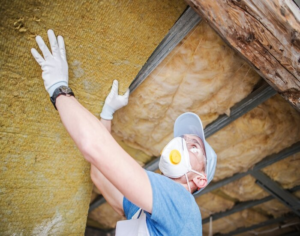Handymen tackle a wide variety of home improvement projects. They can fix squeaky doors, hang a TV, and even complete complex electrical work.
A handyperson usually recommends calling a professional if specialized work like plumbing or electrical repair is involved. This helps ensure the job is done correctly and safely. Click https://jrcsi.com/ to learn more.

A handyman is a professional who can handle a wide range of home repair projects. These include replacing fixtures, painting rooms, and fixing floors. They can also perform general maintenance, such as cutting the grass or installing new lighting fixtures. However, they may be unable to do more complex repairs, such as installing a new bathtub or fixing the roof. In these cases, hiring a more specialized contractor is a good idea.
Choosing the right handyperson for your home repair can be difficult. You must first decide what skills you want the person to have. You can ask friends and family about whom they have used for repairs or look online for reviews and recommendations. The best way to find a reliable handyperson is to receive a referral from someone who has used him before. It will save you time and money in the long run, and it will ensure that the job is done correctly.
The majority of handymen are Jacks (or Jills)-of-all-trades, meaning that they have a variety of repair and construction skills. Some are licensed trade professionals, such as plumbers or electricians, who fill in their slow times by doing handy work for others. Others are former home builders or carpenters who have diversified their skills to meet the demands of a changing economy.
When selecting a handyman, ask for a written estimate that separates labor and materials. You can then ask questions and negotiate the price before beginning the project. Handymen typically charge by the hour or by the project, and you should make sure to get a clear picture of their rates before hiring them. A good handyman will not overcharge, but some might oversell their services.
When hiring a handyman, be sure to check their insurance coverage. A reputable company will provide a Certificate of Insurance to you upon request, and it should be emailed to you immediately after you purchase the policy. If they do not provide this document, it is a red flag that you should avoid them.
Fixing floors
When it comes to fixing floors, a handyman is a great choice. These professionals can repair scratches, dents, and broken pieces on wood and tile floors. They can also sand down the floor to remove any buildup and make it smooth. A handyman can also help you install new carpeting or laminate flooring.
The handyman can also fix a wide range of other issues in your home, such as replacing lights and sockets, rewiring switches and alarms, and installing doorbells and security cameras. They can also do minor plumbing work such as repairing leaks, fixing faucets and toilets, and cleaning out drains. Additionally, a handyman can rewire your home’s electrical system and upgrade your light fixtures to energy-saving ones.
Handymen can also perform many types of furniture assembly. They can put together items such as bookshelves, desks, and tables for you. They can also assemble items that are shipped in boxes, such as beds. Handymen can also help you refinish your old furniture, including sanding and painting it to give it a new look.
Another common job for a handyman is to paint rooms and other surfaces. They can even help you choose the right color for your walls, ceilings, and trim. They can also hang pictures and other wall decor.
A handyman can also take care of other small projects, such as repairing drywall and patching holes. These tasks are usually too small for a contractor, but can be done by a handyman. Handymen often have to follow licensing rules and regulations for their trade, such as registering with the local contractors board.
The handyman is a well-known figure in popular culture. There are songs about him by Elvis Presley, Del Shannon, and James Taylor. Some of these songs portray him as a womanizer, while others are more sympathetic. Handymen are also portrayed in films, TV shows, and comics.
Hiring a handyman is an affordable and convenient way to get those small home repairs finished. They can save you the hassle of searching through Craigslist or asking friends for recommendations. They can also save you the stress of attempting DIY projects that could be dangerous or costly. In addition to the benefits of hiring a handyman, you’ll also get the peace of mind that comes with knowing your project is in good hands.
Painting
Painting is a handyman’s most common service, and it can include everything from hanging shelves or cabinets to repainting an entire room. A handyman can also make repairs to the walls before applying a fresh coat of paint. This can include patching holes, repairing nail pops, and removing old wallpaper. It’s important to note that painting is a skill that requires practice. Inexperienced painters may make costly mistakes that require more money to fix than hiring a professional to do it right the first time.
Painting can be a dangerous task, particularly when working on high walls or ceilings. A handyman will be able to provide the proper safety equipment and knowledge to reduce the risk of accidents and injuries. They can also help with the preparation of the space, such as sanding and priming. This will ensure that the paint job turns out beautifully.
Depending on the size of the room and the type of paint used, painting a room can be expensive. Most handymen charge an hourly rate, but you can save money by negotiating a flat fee. You can also write up a boilerplate service contract that sets out the responsibilities of both parties. This will protect you from clients who don’t pay their bills or may even sue you for damages.
Exterior painting is an important part of a home’s curb appeal. It improves the overall look of a home and increases its value. A quality exterior paint job is durable and lasts for years. A good handyman will prepare the surface of your house by power washing and sanding, and will use the proper tools to avoid a sloppy finish. They will also remove and replace damaged trim, doors, and windows.
Painting is a complex task that requires careful planning and attention to detail. A skilled handyman can complete the project quickly and efficiently without sacrificing the quality of the work. A professional handyman will also clean up and dispose of the painting materials, which is usually included in the cost. In addition, many professional painters offer discounts during off-peak seasons.
Installing appliances
If you’re looking for a professional to install a dishwasher, washing machine or any other appliance, consider hiring a handyman. They’re highly skilled at installing a variety of appliances and can help you save time and energy. They’ll also be able to fix any issues with your current appliances and prevent any problems in the future. Before hiring a handyman, be sure to do some research to find one with good reviews and ratings. Ask for references from past clients and check their credentials. Moreover, you should make sure that they are licensed and insured before hiring them.
A handyman is a skilled worker who can handle small home projects and repairs that are too big for a plumber or electrician to tackle. He or she can also complete more specialized work, such as painting, carpentry, and plumbing. However, he or she is not trained to design and oversee a major renovation project. If the project is too large, a general contractor should be hired.
Besides basic maintenance tasks, a handyman can also help with various other tasks, such as assembling furniture or moving heavy items. He or she can even install a new ceiling fan or light fixture. He or she can also replace an old door lock or window handle, which improves a home’s security and appearance.
Another service that many handymen offer is baby proofing. This includes securing outlets, installing child safety locks, and setting up gate systems. They can also rewire light fixtures and add extra sockets for additional lighting in rooms. Moreover, they can repair and replace damaged doors and frames.
Installing new appliances can be a daunting task, but a skilled handyman can handle this task quickly and efficiently. A handyman can help you install your dishwasher, washing machine, refrigerator and other appliances and ensure that they’re working properly. Moreover, they can install a new ceiling fan or change out the lights in your home to brighten up the place.
Whether you have a long honey-do list or just a few minor jobs, handymen are the perfect solution for your home improvement needs. Hiring a handyman can free up your time and ensure that your home is safe and comfortable for you and your family. They can also save you the cost of a specialized contractor. But, before hiring a handyman, be sure to check with your local city or town hall to see if the job requires a permit. If it does, you’ll need a contractor who can provide the necessary permits and comply with zoning regulations.






